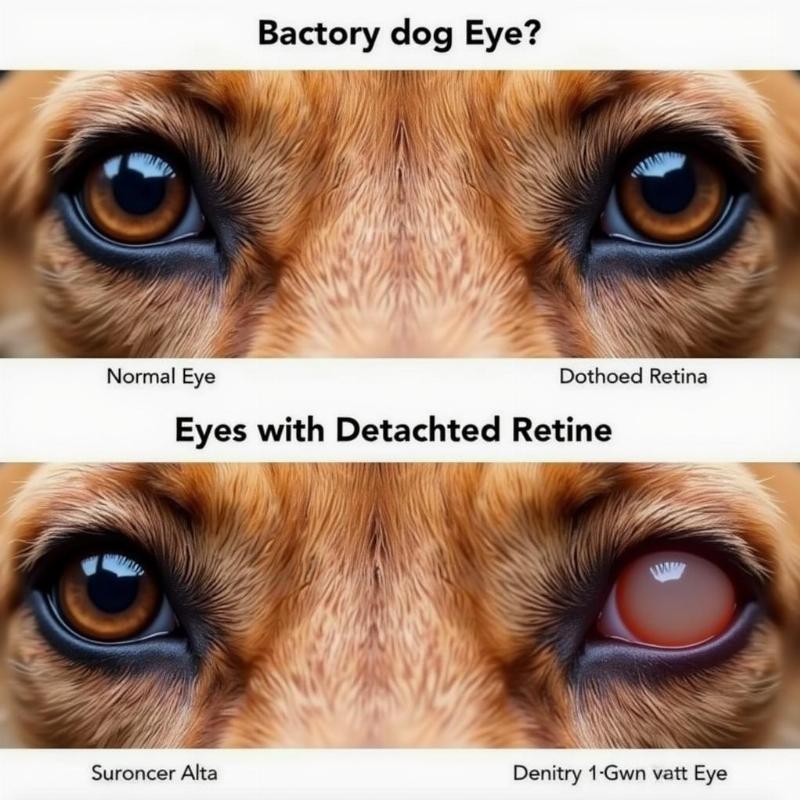Detached retinas in dogs can be a frightening diagnosis for any pet owner. Understanding the condition, recognizing the symptoms, and knowing the treatment options available in the US can help you navigate this challenging situation. This article provides a comprehensive overview of detached retinas in dogs, including what they look like, how they’re diagnosed, and the steps you can take to ensure your furry friend receives the best possible care.
Understanding Detached Retinas in Dogs
The retina is a crucial part of a dog’s eye, acting like the film in a camera. It captures light and sends signals to the brain, allowing your dog to see. A detached retina occurs when this layer separates from the underlying tissue, disrupting this process and potentially leading to blindness. Various factors can contribute to retinal detachment, including genetics, trauma, high blood pressure, and certain underlying diseases. Some breeds, like Collies and Shetland Sheepdogs, are genetically predisposed to this condition.
 Detached Retina vs. Normal Dog Eye
Detached Retina vs. Normal Dog Eye
Recognizing the Signs of a Detached Retina in Dogs
Early detection is critical for managing retinal detachment. While sometimes there are no obvious external signs, several symptoms can indicate a problem. These include:
- Sudden blindness or vision impairment: You might notice your dog bumping into furniture or having difficulty navigating familiar surroundings.
- Dilated pupils: The pupils may appear larger than normal, especially in dim light.
- Cloudiness in the eye: The eye may appear cloudy or hazy.
- Changes in eye appearance: You might observe a visible change in the appearance of the eye, such as redness or swelling.
- Behavioral changes: Your dog may exhibit anxiety, disorientation, or reluctance to move.
If you observe any of these symptoms, it’s crucial to seek immediate veterinary attention.
Diagnosing and Treating Detached Retinas
Veterinarians in the US typically use a comprehensive ophthalmic examination to diagnose retinal detachment. This might involve dilating the pupils, using specialized instruments to examine the retina, and sometimes ultrasound.
Treatment options vary depending on the severity and underlying cause of the detachment. Surgical reattachment is often the most effective option for restoring vision, though it can be costly. Other treatments may include medications to manage inflammation and underlying conditions like high blood pressure.
What to Expect After Diagnosis and Treatment
Post-treatment care is crucial for a successful outcome. This often involves restricting your dog’s activity, administering eye drops, and regular check-ups with your veterinarian. While surgery can be effective, not all dogs regain full vision. The prognosis depends on factors like the extent of the detachment, the underlying cause, and the dog’s overall health.
Living with a Dog with a Detached Retina
Even if your dog doesn’t regain full vision, they can still live a happy and fulfilling life. Making adjustments to your home environment, like removing obstacles and creating clear pathways, can help your dog navigate safely. Consistent routines, positive reinforcement, and plenty of love and attention can significantly improve their quality of life.
FAQs
- Is a detached retina painful for dogs? While the detachment itself may not be painful, the underlying conditions contributing to it can cause discomfort.
- Can a detached retina be prevented? Regular veterinary check-ups, especially for breeds prone to eye problems, can help detect and manage potential issues early.
- How much does surgery for a detached retina cost in the US? Costs vary depending on the complexity of the case and the location, but can range from several hundred to several thousand dollars.
- What is the recovery time after surgery? Recovery typically takes several weeks, with strict activity restriction during the initial period.
- Can a dog with a detached retina still enjoy life? Absolutely! With appropriate care and adjustments to their environment, dogs with limited or no vision can lead fulfilling lives.
- Are there any alternative treatments for detached retinas in dogs? Depending on the specific case, some veterinarians might explore alternative treatments such as laser therapy or cryotherapy.
- What should I do if I suspect my dog has a detached retina? Contact your veterinarian immediately for an examination.
Related Articles
(This section will be populated if relevant articles exist on the Beautdogs.us website.)
About Beautdogs.us
Beautdogs.us is your premier online resource for all things dog-related in the US. We offer expert advice on dog breeds, care, and lifestyle, covering everything from nutrition and grooming to training and health. Our team of experienced veterinarians and dog enthusiasts provides authoritative and engaging content tailored to the American dog owner. Whether you’re a seasoned dog parent or a new puppy owner, Beautdogs.us is your trusted source for comprehensive and reliable information. Contact us today for all your dog-related needs! Email: [email protected]. Phone: +1 501-555-7529.